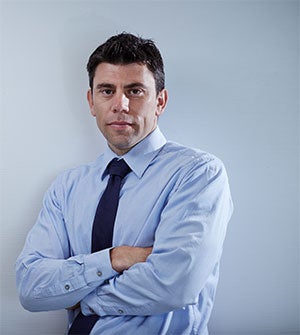
Waterloo researcher to discuss e-cigarettes in Harvard webcast
E-cigarettes may promote tobacco use among new users, says Waterloo expert

E-cigarettes may promote tobacco use among new users, says Waterloo expert
By Christine Bezruki Faculty of Applied Health SciencesE-cigarettes are taking the global nicotine market by storm, spurring researchers to ask whether the new devices are a helpful quitting tool for smokers or a serious threat to public health.

On April 16, David Hammond, a professor in Applied Health Sciences, will join a panel of experts in a live webcast hosted by the Harvard T.H. Chan School of Public Health. The webcast will explore the fiercely debated e-cigarette market—from marketing to youth and the content of warning labels, to the design of the products.
“There are two main possibilities when it comes to e-cigarettes. E-cigarettes may help some of the 4.5 million smokers in Canada to quit. On the other hand, e-cigarettes may promote tobacco use among new users,” said Hammond. “Ultimately, the way e-cigarettes are regulated will determine whether they decrease or increase smoking rates.”
E-cigarettes work by delivering nicotine in aerosol or vapour form through an electronic device often resembling a traditional cigarette. Unlike tobacco cigarettes, e-cigarettes do not contain tobacco and no combustion takes place when they are smoked or vaped.
“There is no question that e-cigarettes are a harmful consumer product. However, because they don’t contain tobacco and release smoke, they are significantly less harmful than smoking,” said Hammond, who testified to a Parliamentary committee in November.
More than 2.5 million Canadians have tried e-cigarettes, with youth making up the largest demographic of users. A 2015 special report found that one in five Canadian youth experiment with the e-cigarettes before they reach nineteen.
Although the Government of Canada prohibits the sale of nicotine-containing e-cigarettes, the devices are still widely available across the country. In the United States, the FDA is quickly moving to regulate e-cigarettes and warning labels.
“At the moment, we have an uncontrolled experiment with e-cigarettes: millions of Canadians are trying products with unknown safety standards for a wide variety of reasons. There is an urgent need for better evidence to guide policy in this fast moving area.”
Date: Thursday April 16, 2015
Time: 12:30 to 1:30 p.m. ET
Location: ForumHSPH.org
Audience members can e-mail questions for the expert participants before or during the live webcast to theforum@hsph.harvard.edu or tweet them to @ForumHSPH using #EcigsForum. Moderators will run a live chat during the lecture on the event web page.

Read more
Here are the people and events behind some of this year’s most compelling Waterloo stories

Read more
Meet five exceptional Waterloo graduate students crossing the convocation stage as Class of 2025 valedictorians

Read more
Irfhana Zakir Hussain works to strengthen Waterloo’s capacity to withstand and recover from climate-related health crises
The University of Waterloo acknowledges that much of our work takes place on the traditional territory of the Neutral, Anishinaabeg, and Haudenosaunee peoples. Our main campus is situated on the Haldimand Tract, the land granted to the Six Nations that includes six miles on each side of the Grand River. Our active work toward reconciliation takes place across our campuses through research, learning, teaching, and community building, and is co-ordinated within the Office of Indigenous Relations.